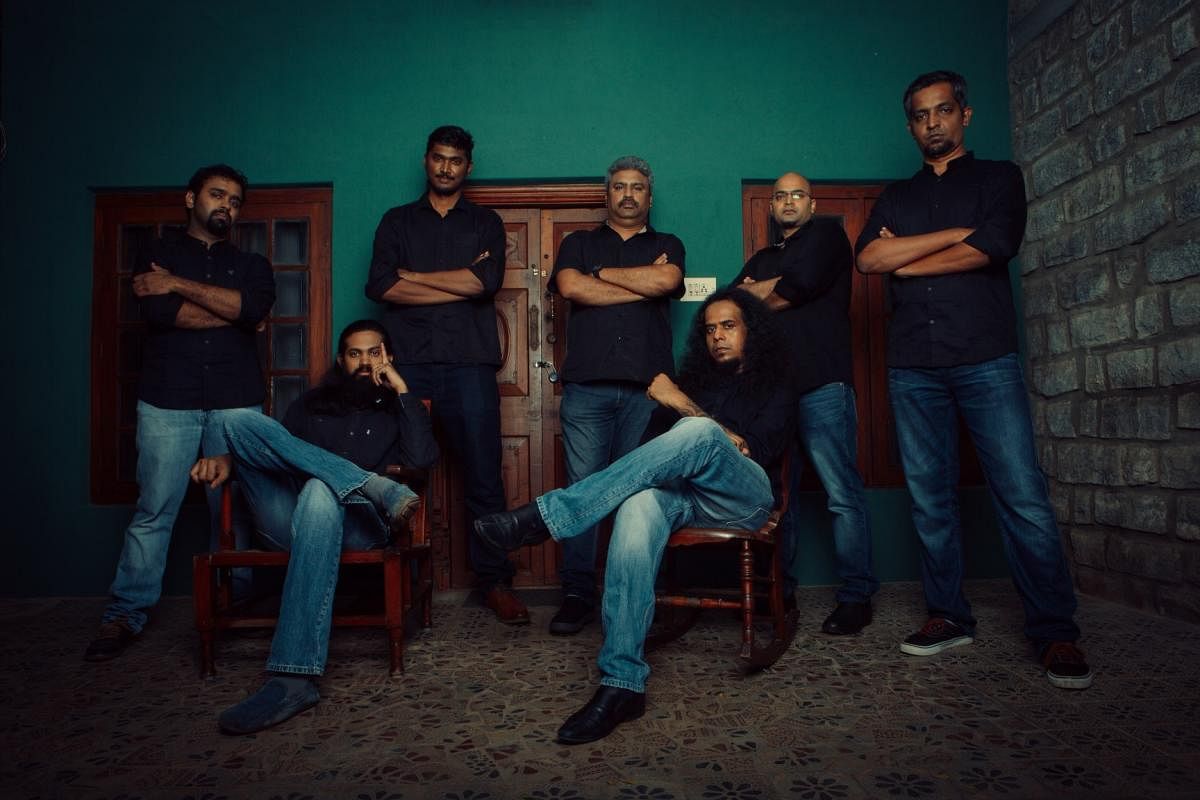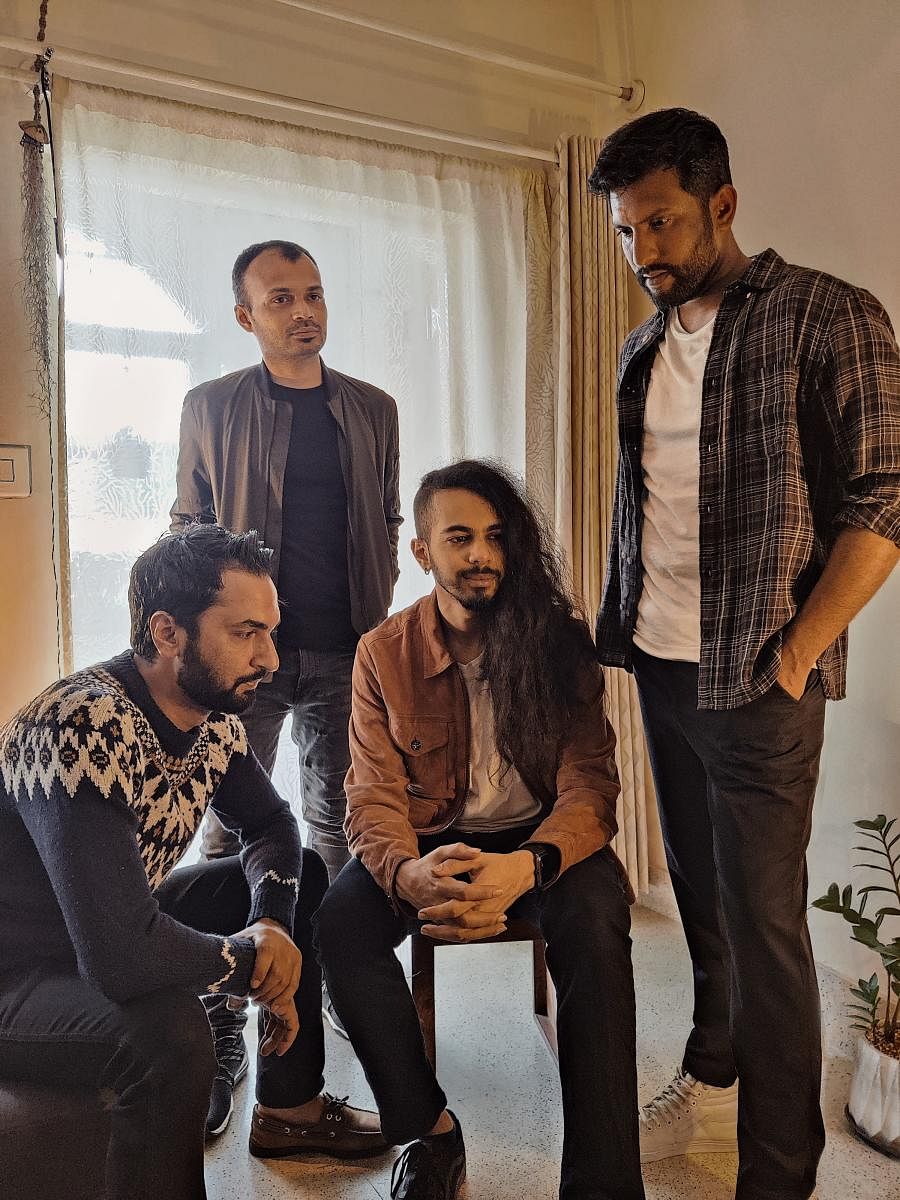Finding their mojo again




The liberalisation in the 1990s did not impact the country's economy alone. There were cultural ramifications too and new platforms like MTV and the Great Indian Rock festival and Rock Street Journal amplified India's rock culture. Bands like Indus Creed, Indian Ocean, Motherjane, and Thermal and a Quarter (TAAQ) struck a fresh note and brought in a new ethos.
Bengaluru, often considered the rock capital of the country, provided a fertile platform for these bands to grow and flourish. From being a college band in 1996 to growing into one of the biggest names in the Indian Independent scene, TAAQ is a homegrown rock band and its members believe that it is Bengaluru's willingness to accept the new and the unknown that fuelled such tremendous growth. From the 90s till now, it has mostly been an upward trajectory for India's rock bands, especially the ones that originated or thrived in Bengaluru. Till the pandemic hit that is.
DIY or die
Bruce Lee Mani, the frontman of TAAQ, recollects that they didn't really start out with a plan. "We were a bunch of college kids having fun on stage... but we were keen on writing our own music back then — and finding some support with fans. The other thing that's made a huge difference is our DIY-or-die approach... No record label? We produced and distributed our albums, set up our own gigs, and worked our way to finding jobs to pay our bills. Amidst all this, we made sure we never fell short of creating original songs," recalls Bruce.
Bands like TAAQ believe staying true to one's music and not jumping on 'trending' stuff is what got them to where they are today. "Music has evolved with us, with our lives and our changing perspectives and situations. It's gig to gig, song to song, album to album. The 'strategy' has been using all the learning from our 'work' lives — where we spent time in corporations big and small, learning how to 'work', how to manage money, how to be team players, how to negotiate the worlds of business, marketing and such," says Bruce. Which is why pandemic or not, their popularity remains pretty much untouched.
Music shaped by the 'ooru'
Other bands though have not been so fortunate. Formed in October 2009, Girish and the Chronicles, a hard rock/melodic rock/progressive/heavy metal band from Sikkim, currently based in Bengaluru, say that they found their true calling in namma city. "This city shaped our ideas and gave us a definite direction. This place has been a hub for concerts, thanks to the ever-growing venues that are open to hosting new bands and showcasing experimental music. When we moved to Bengaluru from Sikkim in 2012, we saw that every venue was packed over the weekend. The audience was receptive to all kinds of music. This sparked a lot of hope in us," Girish Pradhan, the frontman of the band says. He adds that bands like Kryptos, which had already made headway in the rock scene, were an inspiration because they constantly kept producing new music and touring the country.
Girish and the Chronicles gained a cult following with '80s and '90s metal and rock aficionados. They recently performed at the UrRock Festival in Switzerland, sharing the stage with the rock giants Nazareth, in November ‘21.
However, the band didn't perform much during the pandemic but an album they released in March 2020 titled, 'Our Rock and Roll is here to stay' did exceptionally well. "The pandemic year helped us find new music and a new audience," says Girish.
Music as social art
The members of the Bengaluru-based contemporary Carnatic progressive rock band, 'Agam' that was started in 2003, say that their two-decade-old friendship is what brought them together to form a band. "We can never imagine making music sitting in different locations. We have to come together, jam together to make music. Creating music is a social art and music must be written with people coming together. I don't think you can write music sitting in different corners and connecting via a Zoom call," says vocalist Harish Sivaramakrishnan.
While the band largely draws its inspiration from traditional Carnatic music and progressive rock music, it is their experimental nature that attracted a niche following.
What was the pandemic year like? Harish explains that the pandemic taught people that they can still perform without being physically present. "I do not enjoy playing online at all. However, we did a bunch of them because it was better than doing nothing at all. But I feel it is not normal to play music online." He feels rock too, just like any other genre, has its patronage and sub-culture. "The stage is always a better place to connect with the audience. The pandemic has clearly had a detrimental impact on live concerts. But what it taught us was that music can be created under different circumstances; it showed us how technology could be used and forced us to jam online for a while."
Harish is glad though that nothing much has changed. "The 'new normal' is exactly what it used to be in terms of the crowd and the following. We go by the mantra of sticking together and believing in what we are doing. Everything else will fall in place."
'Important to be in the right space'
Parvaaz's sound has often been described as one that transcends musical genres taking the listener into spaces that traverse folk, blues, and psychedelia, wrapped in an ambient sound that is familiar yet elusive.
Sachin Banandur, drummer of the band, feels the rock scene in India has always been evolving. "Many rock bands have been on a big hiatus due to the pandemic but this crisis has given us enough time to rethink and come back with a bigger perspective about our music. We saw a flooding of new music from many Indian bands, from Blackstratblues to TAAQ releasing albums and singles," says Sachin.
They last released their album in October 2019 just before the pandemic. "It’s almost been two years since we have released any new music. Strangely enough, the audience has increased in streaming platforms. Our music has spread to 122 countries with over 1.2 million streams (according to the data from a streaming platform). Not our best numbers but with plans of putting out new music, we are expecting it to grow much bigger," adds Sachin.
Did the pandemic give the band enough time to make new music? Sachin says the band members were scattered in different cities due to the lockdown. "Most of Parvaaz's music is written in the jam-room together. With so many thoughts running through our minds about the future of live music itself, we really couldn’t find the inspiration to write anything at all. Now we are back with renewed vigour."
The impact of streaming platforms
A spokesperson from Spotify informed DHoS about the changes in the listenership in the last couple of years. The spokesperson says, "There was a slight dip in rock music releases during the pandemic, primarily because it was difficult for bands to be together physically; the overall rock music scene has now picked up with newer bands taking the spotlight. For instance, Spotify Radar artist Naalayak. The Local Train still remains one of the most loved rock acts in the country, and bands such as Antariksh and Girish And The Chronicles found a global audience."
Furthermore, he says Antariksh was featured in the international metal playlist with new metal tracks and progressive metal. "The listenership remains steady and there is an upward trend. Fans streamed rock music for bands such as Fossils, Indian Ocean, Parikrama, and more through their own playlist libraries, Spotify curated playlists such as Rock in India, and algorithmic playlists such as Release Radar and Discover Weekly that allow users to discover new music and artistes in the genre."
'We keep things as real as possible'
Thermal And A Quarter (TAAQ) has turned 25. From its roots as a college band in 1996 to taking ‘Bangalore Rock’ on international tours to founding a respected music academy — TAAQ has always been about the journey, not the destination. Bruce Lee Mani, the frontman of the band, talks to DHoS about its journey so far and more. Excerpts from an interview
Your music has influenced a whole generation of young musicians. And this influence extends wide and deep. How do you manage to hold on?
When we started out, it was quite uncommon for young musicians to feel the urge to write original material; it was often told to us that we 'were not worthy' to even try working to create original music. I think through all these years of sustained musical effort and through our body of work, we have legitimised, encouraged, and promoted this 'occupation' or 'career' or whatever you want to call it. And writing as we do of our lives and experiences, we've underlined and validated an artistic identity that is now shared by many other young 'creators' — as is the term used today. Through our educational efforts with Taaqademy, we've also institutionalised many of these aspects, helping young musicians acquire the knowledge, skills, and real-world tools to survive and thrive in artistic endeavours.
How has the band been instrumental in putting Bengaluru on the global map?
Our first international tour was in 2006, and our first gig was in a venue called the 'Barfly' in Glasgow, Scotland. It's a tough town. We were playing to the locals, not 'friendly Indian crowds'. And we were playing music with guitars/bass/drums and lyrics in English. Most of the audience had never heard of a band from India before doing something like this. It was a great gig — we got a lot of love from the folks that came, and the really interesting part was their discovery that musicians in India could make music in a language and format they could relate to, and yet tell stories and write the music in a unique and exotic fashion that they found intriguing and enjoyable. Our international tour gave us new insights into what our fans were looking for. Many of our peers in the Indian indie scene had told us things like "If you're playing abroad, you'd better have some 'Indian' element in your music — either an instrument or classical singing or whatever — otherwise nobody's going to be interested in what you're doing!" And here we were, really rocking it with local audiences in the UK. Connecting in real and tangible ways with people from a different but familiar culture.
Is it a challenge to stay relevant after all these years?
It's definitely a focal point to be that way, so I wouldn't say it is a 'challenge' to be relevant. The challenge is more the translation of our lived experience into a musical art form that can stand the one test that everyone's keen on — time. When we play a song we wrote 25 years ago and feel the words still make sense — then we know we're on to something.
In the age of music apps, what do you think sustains your strong fandom?
I guess we keep things as real as possible and find ways to tell our stories in our own idiosyncratic ways. We have been called 'too eclectic' and 'complex' and ' not pop enough' etc., but the continued interest in our music across 25 years is a testament that we're getting through — to somebody!
Deccan Herald is on WhatsApp Channels| Join now for Breaking News & Editor's Picks